#anyways jflafjsdlk this was an absolute blast to write!! and i'd LOVE to know what you guys think about it: do you agree? disagree?
Explore tagged Tumblr posts
Text
“i love you and i like you”: passion and burnout in Haikyuu!!
tw: discussions of self harm, anxiety, burnout and breakdowns.
spoilers for the whole manga!!
okay this is probably gnna be jflkafjdklfj all over the place, but i’ve been thinking a lot lately about the difference between loving and liking something, and how haikyuu emphasises the importance of both those feelings being present when pursuing a passion.

a quick look at google (and i KNOW my college professors are cringing away in horror victor frankenstein-style @ my use of google definitions but jflajfsdk bear with me!!) demonstrates how often the concepts of love and like are conflated, with love her being framed as a sort of deeper or more intense like: “to like or enjoy very much” to be specific. but personally i’ve always thought there’s something a bit misleading about that kind of definition, since its absolutely possible to love something or someone without necessarily liking them. to take a personal example: i love debate. i debated through middle and high school, made captain of the debate team, and was constantly travelling to and fro for different tournaments. even before i started to debate formally i’d jump at the chance to do mini-debates in class, argue with and rebut parents and friends over meals and causal conversation.... you get the idea. i loved debate, and still love it dearly, but i honestly don’t think i particularly liked it much. tournaments would always fill me with the most INSANE kind of stress, i’d barely eat or sleep in the days leading up to a meet, and i’ve had more muffled bathroom breakdowns in between rebuttals than i can count. after my final year of high school, i decided against joining the debate at university. i knew that if i were to retain ANY love for the activity going into the future, i had to force myself to take a break.
so what does this solipsistic tangent have to do with haikyuu, you ask? well i have no doubt that a vast majority of the players in the series love volleyball. they’re dedicated and passionate about it. they hunger for the chance to be put on the court. but do they like to play?
1. oikawa: “i forgot that volleyball can be fun”
ofc i wouldn’t be an oikawa stan worth my salt if i didn’t start this off with the (grand) king himself!! imo one of the reasons why oikawa is such a popular and well-loved character is his constant determination to keep moving forward and playing, even in the face of seemingly insurmountable opponents and adversities (”never forget my worthless pride”, anyone?). inevitably, all the hard work and practise he put into his craft has left him with a very carefully constructed, put together playstyle-- he’s the kind of player who knows how to bring the best out of each and every teammate on the court because of the amount of time he spends observing them and playing with them. it’s an outlook and playstyle best encapsulated in his now iconic line during the second karasuno v seijoh match:
“Talent is something you make bloom, instinct is something you polish!”
in my opinion the word “polish” it super significant here-- it explicitly singles out the years and years of hard work that set a foundation for his talent and instinct to shine.
but what happens when they don’t shine? there’s no denying that oikawa is an incredibly skilled and intuitive player (something that hinata’s acknowledgment of him as the “great king” to kageyama’s “king” immediately sets out) but oikawa himself is acutely aware of the fact that he can never quite measure up to his long-time rival ushijima or his immensely talented protege kageyama. oikawa’s self described strategy to deal with opponents is to:
“Hit it until it breaks”
but what happens when hitting something again and again with your carefully honed, “polished” skills yields no results? imo there’s a very clear binary mentality drawn here-- either you hit it and it breaks, asserting your superiority; or you hit it and it doesn’t break, enforcing your inferiority. with each perceived loss against ushijima and kageyama, oikawa’s internalized logic holds his own weakness up to his own face, shaking his faith in himself as a player. if you’ll pardon the on-the-nose-metaphor: the whole “hitting it till it breaks” strategy is a two-way street, and oikawa has been hitting himself, metaphorically speaking, for a very long time. i have no doubt that he loved volleyball, passionately, through middle and high school. but with his inferiority complex growing in the face of constantly refuted results, i think he slowly began to like it less and less.
so how does oikawa get his groove back? to answer that, we’ll have to turn to the post-timeskip chapters, particularly the two chapters that deal with oikawa and hinata’s unexpected meeting in Rio (372 and 373 for anyone curious!). while reminiscing with hinata over dinner, oikawa finally reveals the event that made him want to play volleyball (as a setter, to be exact)-- as a child, he watched veteran setter jose blanco step into a game and
“... inconspicuously help[ed] the ace get his bearings again... and then simply left the court.”
oikawa’s reaction to blanco’s playstyle might just be one of my favourite panels in the chapter for how it conveys so much with such little space:

the stammer of “i-i--”, which suggests a sense of resolve and determination forming in real time, finally coalesces into the determined declaration of “i wanna be a setter too!” what i took from this is that oikawa’s admiration for-- and liking of-- blanco expresses itself in the agency with which he makes his choice, in this case, actively deciding to be a setter so that he can support players on the court like blanco did. the liking that oikawa has here is therefore inherently linked to the agency and freedom he feels here-- freedom to choose his position, and how he wants his volleyball career to develop.
this recollection of his childhood memories, and the subsequent game of beach volleyball that oikawa and hinata play afterwards, essentially push oikawa back into the mental and physical space of a child or beginner, as the manga demonstrates with panels of oikawa being forced to ditch his usual carefully developed, polished playstyle to learn the ropes of beach volleyball:

ultimately concluding with the beautiful panel transition of oikawa, as a child AND adult, celebrating after a successful play:
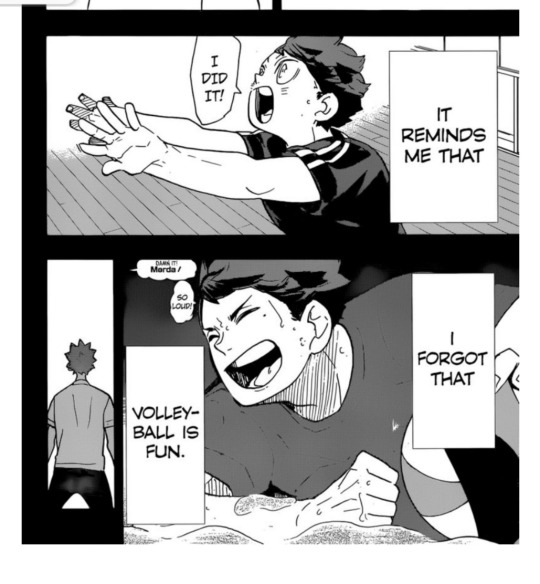
“It reminds me that-- I forgot that-- volleyball is fun.”
in a different country, playing a familiar game by slightly different rules and led back into the mentality and freedom of a novice after years of careful development, oikawa rediscovers his liking for the game.
2. kageyama: “when you get strong, someone stronger will rise to meet you”
moving on to the king of the court himself!! i’d argue that kageyama’s childhood memories and experiences of volleyball function almost oppositely to oikawa’s-- while oikawa has to re-access the sensation of being a beginner again to like the game along with loving it, kageyama’s process of coming to like and love volleyball come from moving away from his early experiences and into a new phase of playing-- specifically, his partnership with hinata.
one of kageyama’s defining features is his individualism-- he’s both skilled and solitary enough to prefer to, as he puts it, “play every single position on the court”. notably, he wants to become a setter because:
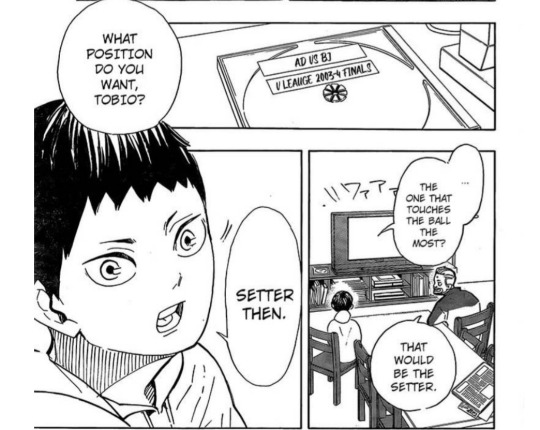
“[it’s] the one that touches the ball the most.”
in fact, i’d argue that kageyama’s “king of the court” attitude that he was known for in middle school is an extension of this individualistic mindset: he holds himself to extremely high standards, and expects his team-mates (as extensions of himself) to meet those very same standards. the similarities between his internal monologue and his commands to kindaichi in these two panels, for example, are strikingly, visibly similar:
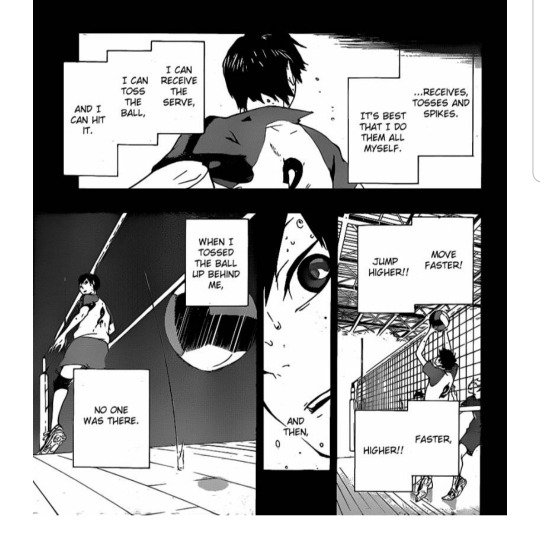
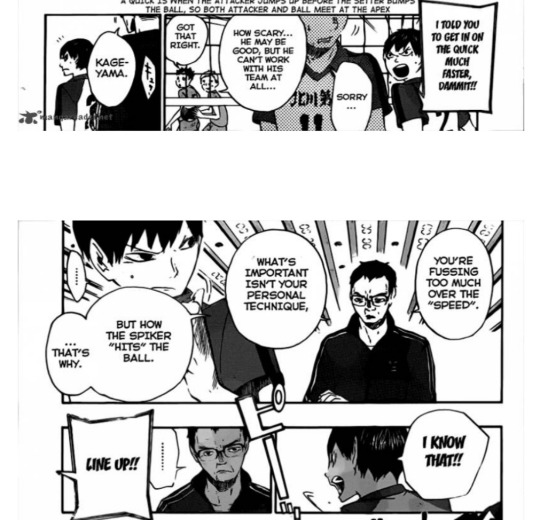
there’s that near-identical intonation of “move faster, jump higher!” that implies that the way he treats his teammates is just an extension of how he treats himself-- a deeply self-critical, miserable way, as it turns out. it’s telling that for the first few chapters of a manga in which characters’ eyes literally light up when they’re happy, passionate or excited, kageyama’s eyes are drawn as pitch black, even while he’s playing.
imo the reason why hinata’s appearance, and their later partnership, is so significant for kageyama’s personal development is because he can’t treat hinata like an extension of himself. hinata challenges him and his preconcieved notions of the sport at every turn: first with his lightning-fast reflexes and raw intuition, and then with his determination to hit kageyama’s toss no matter what. in fact, the first time that kageyama’s eyes light up in the manga is, you guessed it, when he and hinata first pull off a successful “freak quick”:
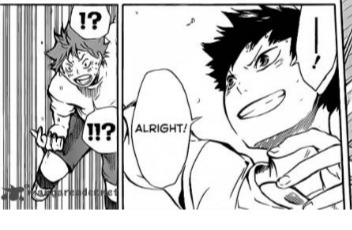
during the post-timeskip chapters we’re introduced to kageyama’s backstory in much greater detail: the way in which his grandfather fostered his passion for volleyball and the timing with which his grandfather’s illness and later death left kageyama increasingly alienated, thus further enforcing his individualist mentality. but what the chapter also gave us was an explicit confirmation of a theme that had been built up from the very beginning of the story, when kageyama’s grandfather tells him:
“when you get really strong, i promise someone stronger will rise to meet you”
i’ve seen translations of the line that use both “meet” and “challenge”, and personally i’d have to say that i prefer “challenge” for what it implies-- even before hinata got strong enough to actually meet kageyama halfway he challenged him to move away from his pre-established mindset of doing everything himself, and into one where he actually comes to enjoy-- and like-- volleyball.
3. hirugami: “maybe you’ve just had your fill”
hirugami’s case is kind of a strange one-- unlike oikawa and kageyama he’s not a major character, and his relationship with volleyball only gets a single backstory chapter as opposed to a series-long arc. but i personally ADORE his mini-arc for the things it has to say about burnout, passion and moving on.
hirugami is introduced as the youngest member of a volleyball family-- his parents, older brother and older sister all play the sport. when explaining how he began to play himself, hirugami says:
“... naturally, i started to play too. because i was good at it, and it was fun.”
imo there are a lot of really interesting things to pick apart with this phrasing: the “naturally” implies a foregone conclusion but also a degree of passivity, like he himself recognises that he was swept up in his family’s influence. the “it was fun” coming AFTER “because i was good for it” also implies a degree of correlation, as though if he didn’t have the aptitude, he wouldn’t enjoy the game (a mindset markedly different to both oikawa and kageyama). as hirugami gets older, this correlation of being good ----> having fun ----> being able to play begins to reverse, and therefore manifest in increasingly self destructive ways:
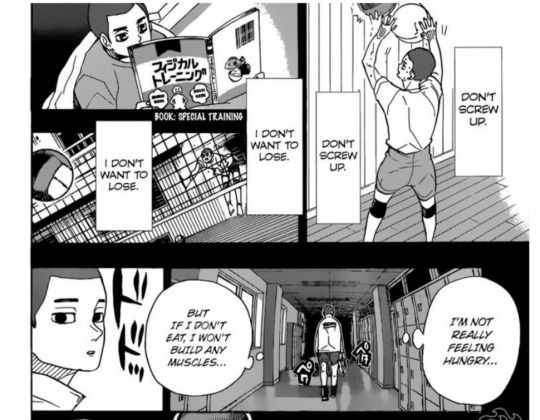
the main impetus for hirugami has now become not wanting to lose, which therefore requires a degree of heightened practise and self discipline in order to achieve. notably, having fun has been reduced to an afterthought, a state that might be achieved if he wins.
the correlation of “winning” and “being good” is a slipperly slope to go down, though, something that becomes especially apparent after hirugami’s team lose a game. the frustration of being unable to reach his goal of winning manifests itself as not being “good enough”-- acting on this, hirugami seeks to punish himself for “messing up”:

the close up panel of hirugami’s “confession” after hoshiumi confronts him hits particularly hard because it taps into a feeling that i’m sure almost all of us have felt at one point or another-- the realisation that something you once both loved AND liked is now only bringing you misery:
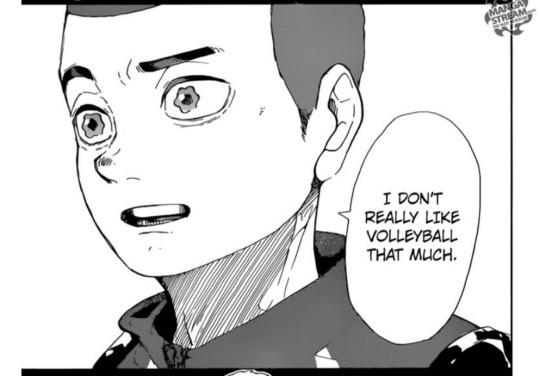
ironically, it’s actually this acknowledgement of “not really liking volleyball that much” that acts as a catalyst for hirugami’s recovery from burnout. hoshiumi’s acknowledgement of, and reply to, hirugami’s state is seemingly simple but deeply freeing:

and honestly, why not just quit? there’s nothing tethering hirugami to volleyball, certainly nothing as serious as life or death. personally my favourite part of this panel is hoshiumi’s description of volleyball as food from which hoshiumi has “eaten his fill”-- a lovely metaphor that re-contextualizes what could be seen as “time wasted” into something productive and indeed nourishing.
when we check up on hirugami post time-skip, we find out that he has indeed quit playing volleyball in favour of going to veterinary school, but he’s seen watching the game between the jackals and adlers on his phone with an eager, fond smile on his face, implying that it was the act of moving away from the table (so to speak) after eating his fill that let him still hold on to a love and passion for the game, even though he is now interacting with it as a spectator instead of a player. and indeed that might just be why i love hirugami’s arc so much-- with it, haikyuu tells us that sometimes passion’s don’t need to be re-ignited in the same way. while oikawa and kageyama rediscover their love for, and liking of, the game through a return to childhood and the arrival of a new partner respectively, hirugami’s journey away from burnout comes from recognizing that he can step away from the volleyball court, and that the love and like will still remain.
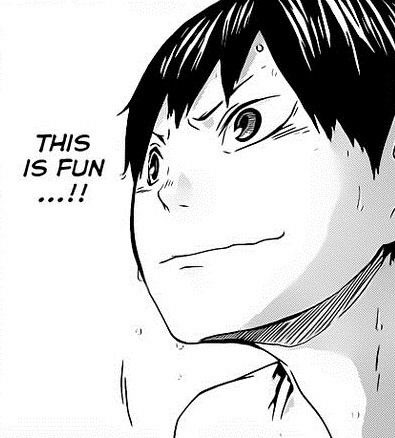
#ari.txt#meta#hq!! meta#haikyuu meta#hq!!#haikyuu#haikyuu!!#oikawa tooru#kageyama tobio#hirugami sachirou#me pointing @ myself: it's her officer! she's the one using her english lit degree to write 3k word long metas on sports anime!!#anyways jflafjsdlk this was an absolute blast to write!! and i'd LOVE to know what you guys think about it: do you agree? disagree?#please do let me know!! :>#long post
188 notes
·
View notes